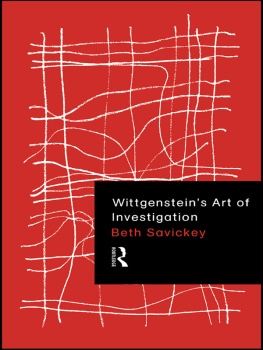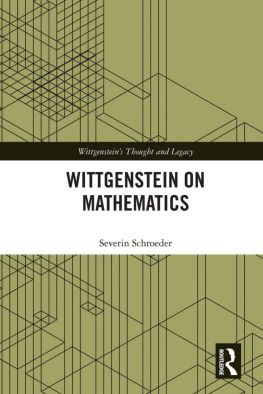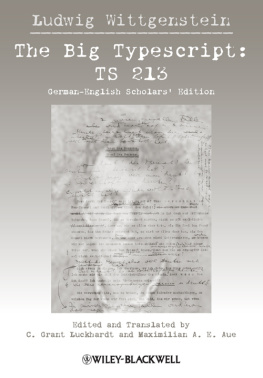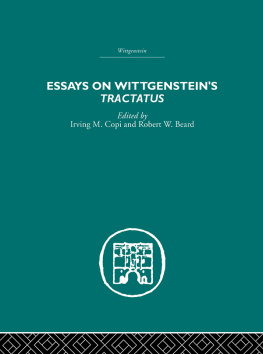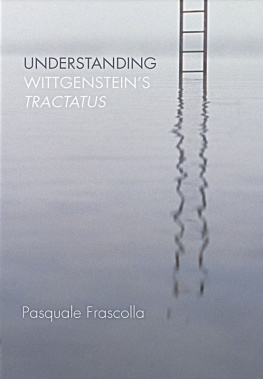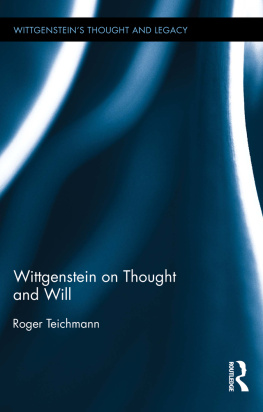Savickey - Wittgensteins art of investigation
Here you can read online Savickey - Wittgensteins art of investigation full text of the book (entire story) in english for free. Download pdf and epub, get meaning, cover and reviews about this ebook. City: London, New York, year: 2002, publisher: Routledge, genre: Children. Description of the work, (preface) as well as reviews are available. Best literature library LitArk.com created for fans of good reading and offers a wide selection of genres:
Romance novel
Science fiction
Adventure
Detective
Science
History
Home and family
Prose
Art
Politics
Computer
Non-fiction
Religion
Business
Children
Humor
Choose a favorite category and find really read worthwhile books. Enjoy immersion in the world of imagination, feel the emotions of the characters or learn something new for yourself, make an fascinating discovery.
Wittgensteins art of investigation: summary, description and annotation
We offer to read an annotation, description, summary or preface (depends on what the author of the book "Wittgensteins art of investigation" wrote himself). If you haven't found the necessary information about the book — write in the comments, we will try to find it.
Wittgensteins art of investigation — read online for free the complete book (whole text) full work
Below is the text of the book, divided by pages. System saving the place of the last page read, allows you to conveniently read the book "Wittgensteins art of investigation" online for free, without having to search again every time where you left off. Put a bookmark, and you can go to the page where you finished reading at any time.
Font size:
Interval:
Bookmark:
The authors style is lucid. She is patient, clear and appropriately repetitious Her writing will be available to undergraduates and hopefully recommended to all readers of Wittgenstein The book is well researchedand will help others to locate themselves more easily among different approaches to Wittgenstein today.
(Judith Geneva, Colorado College)
This book is an original and insightful contribution to the study of the Investigations. It provides a distinctive and illuminating approach to Wittgensteins later philosophy, which places the emphasis, not on the results it is intended to achieve, but on the techniques which constitute Wittgensteins philosophical method.
(Marie McGinn, University of York)
Throughout his later philosophy, Ludwig Wittgenstein focused on a method called grammatical investigation. Grammatical investigation describes the use of our words for the purpose of philosophical clarification. Beth Savickey presents Wittgensteins art of investigation through a detailed examination of his philosophical aims and practices.
Beth Savickeys book is one of the first to focus on and provide an original and detailed analysis of Wittgensteins grammatical investigations. She offers us new insight into the historical context and influences on his method, which will help Wittgenstein students and scholars alike to understand the intricacies and depth of his work.
Beth Savickey is Assistant Professor of Philosophy at Long Island University.

London and New York
First published 1999
by Routledge
11 New Fetter Lane, London EC4P 4EE
Simultaneously published in the USA and Canada
by Routledge
29 West 35th Street, New York, NY 10001
Routledge Ltd is a Taylor & Francis Group company
This edition published in the Taylor & Francis e-Library, 2002.
1999 Beth Savickey
All rights reserved. No part of this book may be reprinted or reproduced or utilised in any form or by any electronic, mechanical, or other means, now known or hereafter invented, including photocopying and recording, or in any information storage or retrieval system, without permission in writing from the publishers.
British Library Cataloguing in Publication Data
A catalogue record for this book is available from the British Library
Library of Congress Cataloguing in Publication Data
Savickey, Beth, 1964
Wittgensteins art of investigation/Beth Savickey.
p. cm.
Includes bibliographical references and index.
1. Wittgenstein, Ludwig, 18891951. Philosophische Untersuchungen.
2. Language and languagesPhilosophy.
3. Semantics (Philosophy). 4. Philosophy. I. Title.
B3376.W563P532721999 9845111
192dc21 CIP
ISBN 0-415-18038-4 (Print Edition)
ISBN 0-203-04531-9 Master e-book ISBN
ISBN 0-203-20775-0 (Glassbook Format)
To my parents Walter and Sharon Savickey who, in their wisdom and generosity, teach me, inspire me and give me courage
my sisters Joan and Tanya who fill my world with laughter and share with me the wonders of this journey
my friends in Winnipeg who, in their musings and their music, are as gifted as they are giving
my teachers from elementary school through university who demonstrated by example that teaching and learning could be both passionate and compassionate
students at the University of Winnipeg (Canada) and the University of York (England) who confirmed for me the power and efficacy of Wittgensteins methods in the classroom and whose intelligence and enthusiasm reminded me daily of the communal and reciprocal nature of teaching
Christine Mason, Bob Haverluck and Mark Rowe for philosophical occasions and conversations, Jacqueline Hall, Stephanie Delaney, Lucy Tattershall, Richard Grieve, Rajesh Kishan, and Dave Court for friendship and food
my colleagues at Long Island University for their generous welcome, their commitment to the present, and their vision for the future
and Dr Marie McGinn who guided this work with intellectual insight and trust and without whom it would not, and could not, have been written
May you all recognize your voices in my work and the thanks in these and all my words
Greetings from New York, January 1998
Between the time a gift comes to us and the time we pass it along, we suffer gratitude. Moreover, with gifts that are agents of change, it is only when the gift has worked in us, only when we have come up to its level, as it were, that we can give it away again. Passing the gift along is the act of gratitude that finishes the labor.
(Lewis Hyde, The Gift)
The author gratefully acknowledges that the following have kindly given permission to reprint the following material:
Blackwell Publishers for permission to reprint extracts from Wittgensteins Lectures: Cambridge 19321935, edited by Alice Ambrose Blackwell Publishers, 1982.
Blackwell Publishers for permission to reprint extracts from The Blue and Brown Books, by Ludwig Wittgenstein Blackwell Publishers, 1969.
Blackwell Publishers for permission to reprint extracts from Philosophical Investigations, by Ludwig Wittgenstein Blackwell Publishers, 1967.
HarperCollins Publishers for permission to reprint extracts from The Blue and Brown Books, by Ludwig Wittgenstein Blackwell Publishers, 1986.
This research was funded in part by a grant from the C.W.Post Research Committee. Additional funding was provided by the Office of the Dean, College of Arts and Sciences, C.W.Post Campus, Long Island University.
Numbers refer to individual remarks. Page numbers are followed by e which denotes the English pagination of bilingual texts. MS in the text means manuscript.
Throughout his later philosophy Wittgenstein claims to be teaching a method of grammatical investigation. Grammatical investigation describes the use of our words for the purpose of philosophical clarification. As a method it is both philosophical and pedagogical. Wittgenstein once remarked to the effect that it did not matter whether his results were true or not, what mattered was that a method had been found, and he describes the Investigations as a textbook: a textbook, however, not in that it provides knowledge (Wissen), but rather in that it stimulates thinking (Denken). As he anticipated, the terms of our analysis have changed, but the form of our philosophical investigation has not (AWL 32). His own words continue to best describe the situation:
If I had to say what is the main mistake made by philosophers of this present generation I would say that it is when language is looked at what is looked at is a form of words and not the use made of the form of words.
(LC2)
Not only did philosophers of Wittgensteins generation look at a form of words (rather than their use) in the analysis of language, but contemporary philosophers continue to look at the form and not the use made of Wittgensteins own words. His philosophical method is the use made of his form of words.
The following study investigates Wittgensteins method of grammatical investigation through a detailed examination of his philosophical aims and practices. It begins by placing his method within a philosophical and pedagogical context. When placed within an Anglo-American or analytic tradition this method appears to be without precedent. However, Wittgensteins philosophical practices were influenced by the numerous and diverse traditions within which he lived. Placing him within an Austrian cultural and pedagogical tradition complements and enhances the analytic tradition with which he is generally identified. The specific aims and techniques of his investigation become clear when placed within an Austrian cultural tradition (with its emphasis on language) and within an innovative educational movement (with its emphasis on activities and the rooting of education in the environment). Wittgenstein himself places his writings within this Austrian context.
Font size:
Interval:
Bookmark:
Similar books «Wittgensteins art of investigation»
Look at similar books to Wittgensteins art of investigation. We have selected literature similar in name and meaning in the hope of providing readers with more options to find new, interesting, not yet read works.
Discussion, reviews of the book Wittgensteins art of investigation and just readers' own opinions. Leave your comments, write what you think about the work, its meaning or the main characters. Specify what exactly you liked and what you didn't like, and why you think so.

